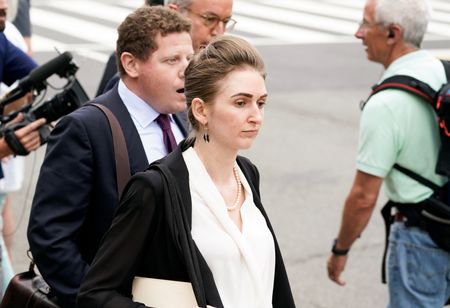By Luc Cohen
WASHINGTON (Reuters) -A husband-and-wife duo on Thursday pleaded guilty to laundering money stolen in a 2016 hack of cryptocurrency exchange Bitfinex through an elaborate scheme involving burying gold coins and burning documents in a trash can in Kazakhstan.
In a hearing before U.S. District Judge Colleen Kollar-Kotelly in Washington, Moscow-born U.S. citizen Ilya Lichtenstein admitted to hacking the exchange and enlisting his wife, an online rapper named Heather Morgan who has gone by the alias “Razzlekhan,” to help conceal some 119,754 stolen bitcoin.
The tokens were worth $71 million at the time of the hack but had appreciated to more than $4.5 billion at the time of their February 22 arrests in New York.
Deputy Attorney General Lisa Monaco said at the time the $3.6 billion in assets recovered was the biggest financial seizure in U.S. Department of Justice history. The DOJ has since recovered $475 million more, and the couple in court on Thursday agreed to jointly forfeit $72 million.
Lichtenstein, 35, has a degree in psychology and describes himself in his LinkedIn profile as a technology entrepreneur.
But prosecutor Christopher Brown said Lichtenstein also had a long history of hacking, including as a juvenile, and had stolen funds from virtual currency exchanges prior to 2016.
After Lichtenstein hacked the exchange, Brown said Morgan – who has said her hip-hop moniker refers to Genghis Khan but with more “pizzazz” – helped him set up accounts with fictitious identities to help hide proceeds.
“It was at my direction,” Lichtenstein told the judge.
Lichtenstein acknowledged converting some funds to gold coins, which he gave to Morgan, who buried them in California. Law enforcement has since dug them up, a prosecutor said.
BURNING DOCUMENTS RAISE SUSPICIONS
Morgan, 33, said in a separate plea hearing that her husband first told her he had hacked the exchange in 2020, but that she had long been suspicious his money came from an illicit source such as drugs or tax evasion.
She said the couple took several trips to Ukraine and Kazakhstan, which she thought were for tourism and generating business for a company they ran.
But she said alarm bells went off when she saw Lichtenstein burning documents in a trash can during a Kazakhstan visit.
“When I asked him about it, he was evasive,” Morgan said.
Prosecutors said Lichtenstein actually used the trips to meet with “money mules” who converted cryptocurrency into government-issued currency and deposited it into Russian and Ukrainian banks. Lichtenstein and Morgan would then withdraw cash from the accounts in the United States.
Sentencing dates were not set. Both defendants agreed to cooperate with the U.S. Attorney’s office in Washington as part of a late July plea deal.
Before Lichtenstein’s plea hearing ended, his lawyer Samson Enzer asked Kollar-Kotelly if his client, who is jailed, could speak to Morgan, who is free on bail and was in the courtroom audience.
A member of the U.S. Marshals Service told them no contact was allowed.
Lichtenstein, wearing a dark green T-shirt reading “prisoner” on the back, then looked toward Morgan and puckered his lips as if to blow a kiss. Morgan waved back as he was led out of the courtroom.
(Reporting by Luc Cohen in Washington; Editing by Andrea Ricci)


